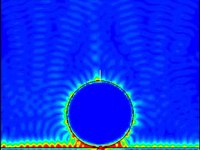
Photo from wikipedia
Abstract We develop all of the components needed to construct an adaptive finite element code that can be used to approximate fractional partial differential equations, on non-trivial domains in d… Click to show full abstract
Abstract We develop all of the components needed to construct an adaptive finite element code that can be used to approximate fractional partial differential equations, on non-trivial domains in d ≥ 1 dimensions. Our main approach consists of taking tools that have been shown to be effective for adaptive boundary element methods and, where necessary, modifying them so that they can be applied to the fractional PDE case. Improved a priori error estimates are derived for the case of quasi-uniform meshes which are seen to deliver sub-optimal rates of convergence owing to the presence of singularities. Attention is then turned to the development of an a posteriori error estimate and error indicators which are suitable for driving an adaptive refinement procedure. We assume that the resulting refined meshes are locally quasi-uniform and develop efficient methods for the assembly of the resulting linear algebraic systems and their solution using iterative methods, including the multigrid method. The storage of the dense matrices along with efficient techniques for computing the dense matrix–vector products needed for the iterative solution is also considered. The performance and efficiency of the resulting algorithm is illustrated for a variety of examples.
Journal Title: Computer Methods in Applied Mechanics and Engineering
Year Published: 2017
Link to full text (if available)
Share on Social Media: Sign Up to like & get
recommendations!